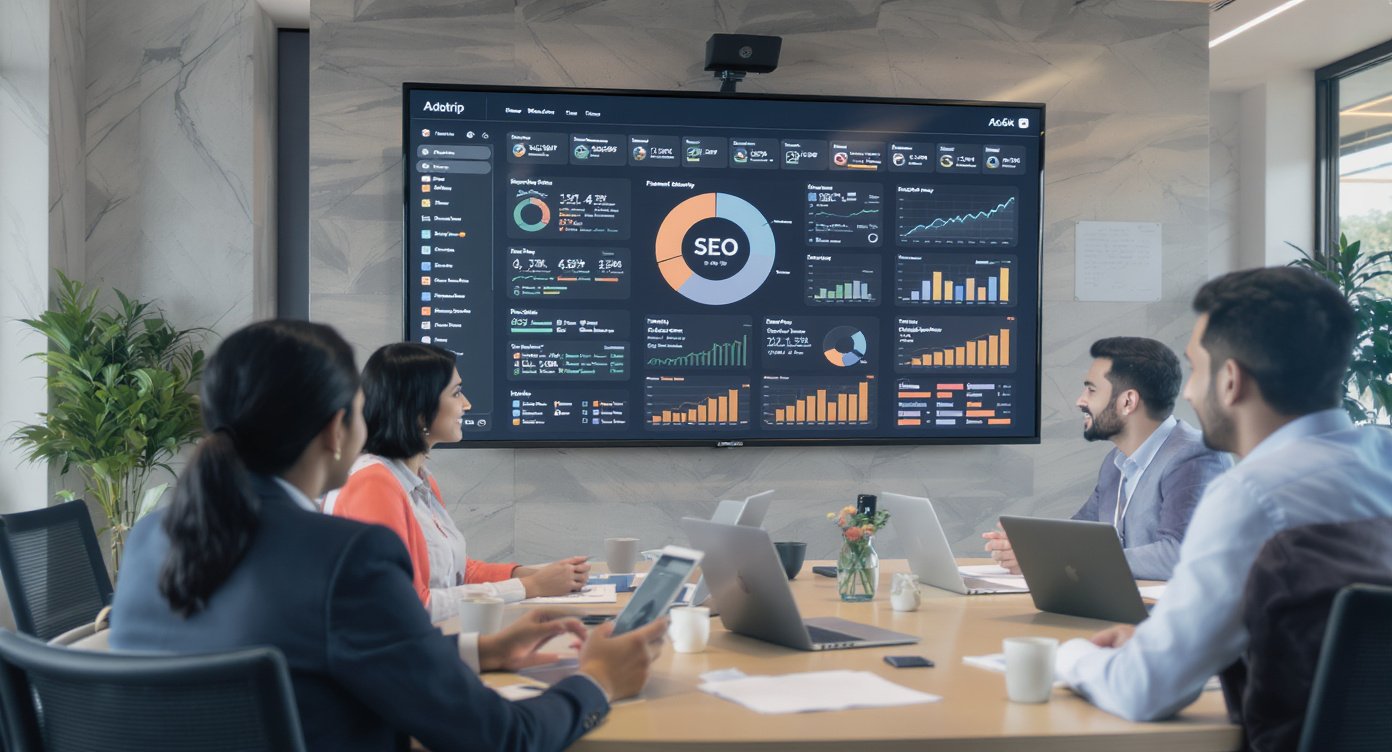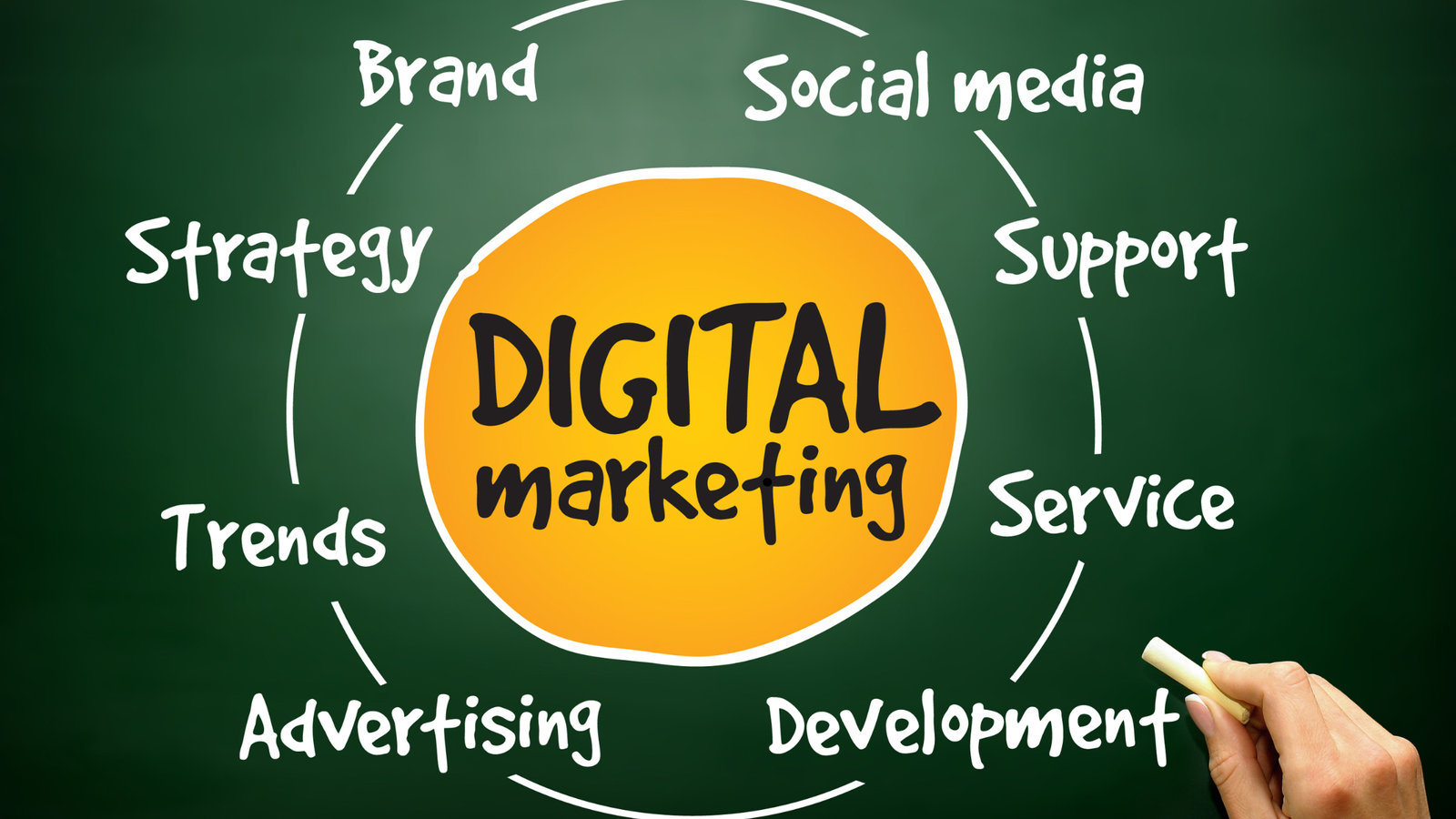In the past decade, Search Engine Optimization (SEO) has evolved at an unprecedented pace. Traditional SEO strategies, once reliant solely on keyword stuffing and link-building, are now complemented by sophisticated AI-driven tools and technologies. The emergence of Artificial Intelligence (AI) in the digital marketing landscape has transformed how businesses optimize their online presence, offering both opportunities and challenges. In this comprehensive guide, we explore the rise of AI in SEO, the potential it brings, and the challenges companies may face in adopting it.
At Adomantra, a leading SEO Services Agency of India, we have observed firsthand how AI integration is reshaping digital strategies for businesses across industries. Understanding these changes is crucial for marketers aiming to maintain a competitive edge in an increasingly technology-driven ecosystem.
Understanding AI in SEO
Artificial Intelligence refers to systems that mimic human intelligence by processing data, learning from it, and making decisions or predictions. In the context of SEO, AI technologies leverage algorithms, machine learning, and natural language processing (NLP) to enhance search engine rankings, understand user intent, and improve content relevance.
Some key AI technologies impacting SEO include:
- Machine Learning (ML): Algorithms analyze patterns in search behavior, website performance, and competitor strategies to recommend actionable improvements.
- Natural Language Processing (NLP): Helps search engines understand the semantic meaning behind queries, enabling more precise results for users.
- Predictive Analytics: AI tools predict trends and behaviors, allowing marketers to optimize content proactively.
- Voice Search Optimization: AI-powered voice assistants like Siri and Alexa require SEO strategies to adapt to natural language queries.
For businesses in India and globally, leveraging AI in SEO can lead to improved efficiency, better targeting, and higher ROI on digital campaigns.
Opportunities Presented by AI in SEO
1. Enhanced Keyword Research
Traditional keyword research involves manual identification of relevant terms and their search volume. AI-powered tools, however, analyze vast datasets to uncover high-value keywords, including long-tail and semantic keywords that might otherwise be overlooked.
For instance, Adomantra, as an expert SEO Services Agency of India, employs AI-driven keyword tools to identify trending keywords that align with user intent. This approach ensures that businesses can target phrases that are more likely to convert.
2. Improved Content Creation
Content remains a cornerstone of SEO. AI tools like GPT-powered assistants can assist in generating high-quality content, optimizing readability, and maintaining keyword density. By analyzing user engagement and search intent, AI helps marketers create content that resonates with the audience and aligns with search engine algorithms.
Moreover, AI can identify content gaps by analyzing competitors’ websites, enabling businesses to develop content that meets unfulfilled user needs. This strategic approach increases organic traffic and improves domain authority.
3. Personalized User Experience
Search engines increasingly prioritize user experience (UX). AI enables websites to personalize content, recommend products, and optimize navigation based on user behavior. This personalization not only increases engagement but also positively impacts SEO rankings, as search engines reward websites with higher dwell time and lower bounce rates.
For example, e-commerce businesses in India can leverage AI to provide personalized product recommendations, which enhances user experience and boosts conversions.
4. Predictive SEO and Trend Analysis
AI can forecast emerging trends by analyzing vast amounts of search and social data. Predictive SEO allows marketers to anticipate changes in search algorithms and user behavior. By adapting strategies ahead of time, businesses can maintain visibility and stay ahead of competitors.
Adomantra employs AI-based trend analysis tools to advise clients on seasonal keyword strategies, content updates, and link-building opportunities. This proactive approach ensures that businesses remain relevant in the ever-changing SEO landscape.
5. Automation of Routine Tasks
SEO involves several repetitive tasks such as backlink analysis, site audits, and performance tracking. AI tools automate these processes, saving time and reducing human error. Automated reports provide insights into traffic trends, keyword performance, and technical SEO issues, allowing marketers to focus on strategy rather than manual data collection.
Challenges of Implementing AI in SEO
While AI presents significant advantages, businesses must also navigate challenges to fully harness its potential.
1. High Implementation Costs
Adopting AI-driven SEO tools and technologies often requires significant investment. Advanced software, training, and integration costs can be substantial, particularly for small and medium-sized enterprises. Businesses must carefully assess the ROI of AI adoption before committing resources.
2. Dependence on Data Quality
AI relies on high-quality data to function effectively. Poor data quality can lead to inaccurate insights, misdirected strategies, and suboptimal results. Businesses must invest in proper data collection, cleaning, and management to ensure AI tools provide reliable recommendations.
3. Risk of Over-Automation
While automation enhances efficiency, over-reliance on AI can lead to generic content, lack of creativity, and a diminished human touch. Search engines like Google continue to value content that demonstrates expertise, authority, and trustworthiness (E-A-T). Maintaining a balance between AI-generated insights and human creativity is crucial for long-term SEO success.
4. Rapidly Evolving Search Algorithms
Search engine algorithms are constantly evolving. AI tools must be continuously updated to reflect these changes. Without regular updates and monitoring, businesses risk implementing outdated strategies that could negatively impact rankings.
5. Privacy and Ethical Concerns
AI-driven SEO often involves collecting and analyzing user data. Businesses must ensure compliance with privacy regulations such as GDPR and India’s Data Protection Laws. Ethical AI practices are essential to build trust with users and maintain brand reputation.
AI Tools Revolutionizing SEO
Several AI-powered tools are shaping the future of SEO:
- MarketMuse: Assists in content research, optimization, and identifying content gaps.
- Surfer SEO: Provides data-driven insights for on-page optimization and keyword targeting.
- Clearscope: Analyzes content for relevance and semantic keyword usage.
- BrightEdge: Offers AI-based recommendations for search engine visibility and performance tracking.
- Frase: Uses AI to generate content briefs and optimize content for search intent.
By integrating these tools, businesses can optimize their SEO campaigns more effectively, making data-driven decisions and improving search visibility.
Future of AI in SEO
The integration of AI in SEO is expected to grow exponentially. Some future trends include:
- AI-Generated Content Expansion: As AI models become more advanced, businesses will increasingly rely on AI for scalable content creation.
- Voice Search Optimization: AI will continue to refine search engines’ understanding of natural language, making voice search more prevalent.
- Visual and Video Search: AI technologies in image recognition and video analysis will enable richer search experiences.
- Predictive Personalization: AI will allow even more precise personalization of content and marketing strategies, enhancing user engagement.
These trends indicate that businesses that adopt AI early will gain a competitive advantage, while those resistant to change may struggle to maintain visibility.
How Businesses in India Can Leverage AI in SEO
For companies looking to enhance their SEO strategies in India, working with a professional agency is highly beneficial. Adomantra, a leading SEO Services Agency of India, provides AI-integrated SEO solutions that:
- Conduct comprehensive AI-driven keyword research.
- Optimize content using predictive analytics and NLP insights.
- Improve user experience through AI-powered personalization.
- Monitor performance with automated SEO dashboards.
By leveraging AI, businesses can achieve higher search engine rankings, improve online visibility, and maximize ROI on digital marketing campaigns.
Conclusion
The rise of AI in SEO represents a paradigm shift in digital marketing. While it presents numerous opportunities—such as enhanced keyword research, personalized user experiences, predictive insights, and automation—it also comes with challenges, including high costs, data dependency, and ethical considerations.
Businesses that embrace AI strategically, balancing automation with human creativity, will thrive in the competitive online ecosystem. Agencies like Adomantra, the trusted SEO Services Agency of India, are at the forefront of this revolution, helping businesses unlock the full potential of AI-driven SEO.
As AI continues to evolve, staying informed and adaptive will be the key to sustained SEO success in India and globally. Investing in AI-driven SEO is not just a trend—it’s a necessity for businesses aiming to stay competitive in the digital age.
Frequently Asked Questions (FAQ)
1. What is AI in SEO?
AI in SEO refers to the use of Artificial Intelligence technologies, such as machine learning, natural language processing, and predictive analytics, to optimize websites, improve search engine rankings, and understand user behavior. AI helps businesses automate tasks, generate insights, and create content aligned with search intent.
2. How is AI transforming SEO strategies?
AI is transforming SEO by enabling data-driven decision-making. It enhances keyword research, content creation, personalization, and predictive SEO. Businesses can use AI to analyze competitor strategies, forecast trends, and optimize their digital marketing campaigns efficiently.
3. What are the benefits of AI in SEO?
Some key benefits include:
- Enhanced keyword targeting
- Improved content relevance
- Personalized user experiences
- Automated reporting and site audits
- Predictive insights for future trends
These advantages help businesses increase organic traffic, boost conversions, and stay ahead of competitors.
4. Are there challenges in using AI for SEO?
Yes. Businesses face several challenges when integrating AI into SEO, such as:
- High implementation costs
- Dependence on quality data
- Risk of over-automation leading to generic content
- Rapidly changing search engine algorithms
- Privacy and ethical concerns
Proper strategy and guidance from experts can mitigate these challenges.
5. Which AI tools are best for SEO?
Popular AI-powered SEO tools include:
- MarketMuse – for content research and optimization
- Surfer SEO – for on-page SEO recommendations
- Clearscope – for semantic keyword analysis
- BrightEdge – for performance tracking and insights
- Frase – for content briefs and optimization
These tools help businesses create data-driven SEO strategies.
6. How can AI improve content creation?
AI tools analyze user intent, trending topics, and competitor content to generate high-quality content ideas. They assist in optimizing readability, keyword placement, and content gaps, ensuring content aligns with both user expectations and search engine algorithms.
7. Can AI help with voice search optimization?
Yes. AI and NLP technologies enable websites to optimize for natural language queries. With the rise of voice assistants like Siri, Alexa, and Google Assistant, AI helps businesses target voice search effectively, enhancing discoverability.
8. How does AI personalize user experience for SEO?
AI analyzes user behavior, preferences, and engagement patterns to provide personalized content, product recommendations, and navigation experiences. Improved UX leads to longer dwell times, lower bounce rates, and better search engine rankings.
9. Why should businesses in India consider AI for SEO?
India’s digital landscape is rapidly growing, with increasing competition online. AI-driven SEO enables businesses to optimize strategies efficiently, improve search visibility, and achieve better ROI. Partnering with an expert agency like Adomantra, a top SEO Services Agency of India, can provide tailored solutions leveraging AI.
10. Is AI replacing SEO professionals?
Not entirely. AI complements human expertise by automating repetitive tasks and providing insights. Human creativity, strategy, and judgment are still crucial for content quality, brand voice, and ethical SEO practices.
11. How do I start using AI in SEO for my business?
To start, businesses should:
- Conduct an SEO audit using AI tools
- Identify keyword and content opportunities
- Implement AI-driven content optimization
- Monitor performance with AI-based analytics
- Collaborate with a professional SEO Services Agency of India, such as Adomantra, to ensure effective adoption
12. What is the future of AI in SEO?
The future of AI in SEO includes:
- Greater reliance on AI-generated content
- Increased voice and visual search optimization
- Predictive personalization of marketing strategies
- More sophisticated AI-driven analytics for decision-making
Businesses that adapt early will gain a competitive edge in search visibility.
Read More: techners












Leave a Reply